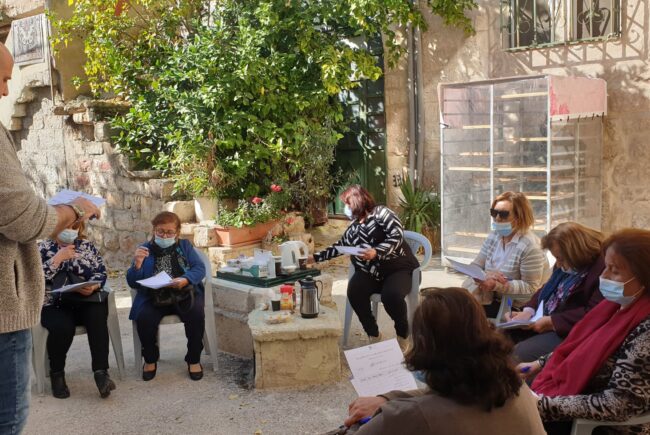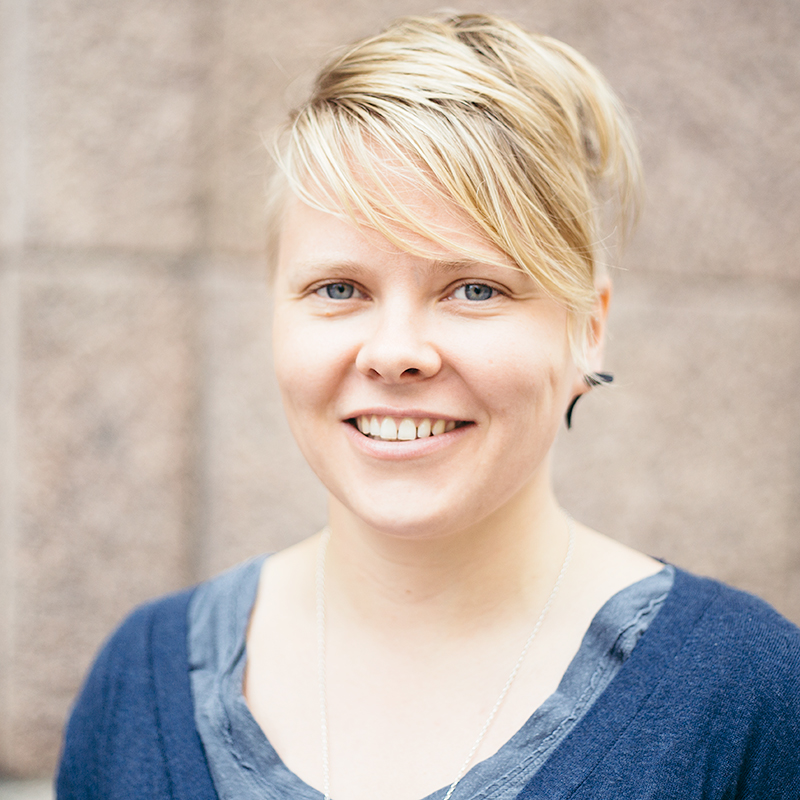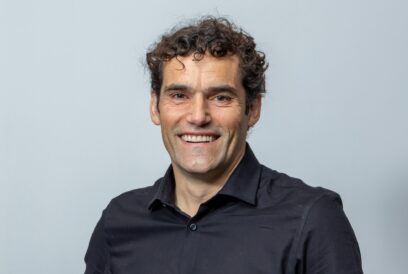

CP serves as the link between the university and community by identifying emerging developmental needs and responding to them through different service programmes. The photo is from a training course in marketing for women from Community Based organizations in the Bethlehem District. Photo credit: ICP
CP serves as the link between the university and community by identifying emerging developmental needs and responding to them through different service programmes. The photo is from a training course in marketing for women from Community Based organizations in the Bethlehem District. Photo credit: ICP
Pursuing higher education can be the only way to spend time, if there is no work or other possibilities. Palestinian university engages students by offering engagement with the community.
There is a saying that Palestine accommodates the most highly educated unemployed people in the world.
Education plays a strong role in Palestine. Out of the 5 million adult population of the occupied Palestinian territory 96% of the people are literate and nearly half of them pursue tertiary education. On the other hand, the 60% unemployment rate of people with higher education correlates with the overall high unemployment in the area.
“This is mainly due to the type of economy that we have. Because of the occupation, we have not managed to have an independent economy, it is always annexed to the Israeli economy. The focus of Palestinian governments over the past decades has been in the service sector, and other extremely important sectors such as agriculture or industry have been neglected,” says Dr Moussa Rabadi, Director of the Institute for Community Engagement and Partnership (ICP) at Bethlehem University (BU).
“This leaves people with two major alternatives. To go and work as workers in Israel or to go to a university to pursue a degree and try to open a new door locally or even internationally. Education is largely the main option for people.”
Palestine has been under Israeli occupation since 1967. Democratic development in the occupied territory is challenging. Presidential elections were last held in 2005 and the authority has been limiting the operating space of civil society and the media.
During the occupation, close to 700 000 Israeli settlers have moved to the occupied territory. The international community considers the annexation of East Jerusalem and the Israeli settlements in the West Bank illegal under international law, and has consistently been calling for the end of the occupation, including the blockade of Gaza. Most European countries have notably tied recognition to progress in the peace process and in overcoming the Palestinian division.
Motivation for learning
One could think, that motivating oneself to lifelong learning in such an environment where years’ hard work does not guarantee a career or even a job would be useless. What makes the young adults of Palestine want to attend the universities and pursue a degree if that is not a promise of change in their life?
“I think it is part of Palestinian culture; the appreciation for educated people and education in general. Part of the culture is that you have better social status is you are educated and have a degree,” says Dr Moussa.
At the end of the day they go to the universities since they do not have anything else to do.
In addition to the culture, he names parents, career guidance at schools and the active engagement of universities at secondary schools as the agents for promoting higher education. The state of affairs plays a role in showing the path to continuing education.
“If there is no work and the youth do not go to university, for them it is a waste of time just to stay at home. Even if it looks like a strategic investment for them, at the end of the day they go to the universities since they do not have anything else to do.”
Highly educated mothers
Although the students attending universities in Palestine come from various backgrounds in towns, villages and refugee camps, one group dominates the campuses. Almost 70% of the students at Bethlehem University are women.
The unemployment rate for educated women is even higher than it is for men. There is still thinking that women do not need to work, they are not the bread-winners, and this goes for the employers as well. However, women are eager to experience university life. Especially for women coming from conservative places, going to university can be a taste of a freer life, attending activities and socialising with peers.
“In conservative places, families send their daughters to universities, but it is for them to be better mothers, to be able to teach and educate their children in the future,” Dr Moussa says.
It wasn’t acceptable to go to school while you are married.
47-year old Lina Hammouri, a business administration graduate from Al Quds open university in Hebron and diploma student from Bethlehem University was determined to study despite the barriers to it. Her motivation to educate herself did not stop despite having to discontinue her studies in her 12th year during the first intifada.
“There was closure of schools and universities, many demonstrations, shooting and bullets with teargas and bombs on our journey from home to school and on the way back. My father was worried about me, so he convinced me to get married and stay at home to be safe.”
Lina dreamt of continuing her studies, but faced problems set by the culture. “It wasn’t acceptable to go to school while you are married.”
After having three sons it was time for Lina to start aiming towards her own dreams.
“Finding that my husband was busy all the time in his work and my children were always out with their friends, I went back to finish my school and to the university to study business administration. I decided to let my dream come true, to do something for myself and to be an active person in society, not only a mother and a wife.”
Community engagement is a two-way service
Due to the high demand, the number of universities and study programmes in Palestine have been growing. The competition for students, whose mobility has become more difficult as a result of the segregation wall, has increased.
Bethlehem University is the oldest university in Palestine, dating from 1973. At the same time, it deliberately continues to be one of the smallest in terms of number of students, admitting just 3,300 per year.
According to their strategy, instead of expanding in terms of numbers, BU aims to provide high-quality programmes and focus on the employability of the graduates.
“It is not just providing knowledge to the students. To build the competences of the students, we are offering many courses in life skills, career guidance and entrepreneurship. Helping them build their personalities, strengthening their democratic values and civic responsibilities and contributing to the common good are important,” Dr Moussa says.
As one of the pillars of its education programmes, BU has adopted the strategy of having more community engagement.
Our main concern is the employment of the graduates.
ICP, of which Dr Moussa is the director, serves as the link between the university and community by identifying emerging developmental needs and responding to them through different service programmes. This means close partnership with local organisations and industries, exploring opportunities for working with the market and engaging all the students, regardless of the faculty or study programme, in community service.
This can mean, for example, a project with the local community run jointly by students from social sciences and business school, or doing a seminar paper focusing on solving an existing problem for an NGO.
“The strategy has been adopted for two main reasons: firstly, to market the university and secondly, and more importantly, to help to provide the students with attributes that create more demand for graduates. Our main concern is the employment of the graduates.”
Community engagement is seen as a two-way service. While mobilising the resources of the university in the community and serving its needs, the projects provide learning experiences and create a feeling of civil responsibility for the students and a feeling that they are contributing. Dr Moussa has seen much community project participation turn into volunteer work or even a job within the NGO.
Work opportunities through community work
Engaging with NGOs and CBOs in community projects can be one of the key issues for employment opportunities, especially for women. Despite several diplomas, work experience and hundreds of job applications, Lina Hammouri has not been able to land a permanent job.
“I am very dynamic and active. I work part-time and would like to get a good job but, in this country, it’s very hard because of fewer opportunities and the need for a recommendation from someone inside the organisation you’re applying for.”
Besides part-time work and positions of trust, Lina is active in volunteer work and hopes that it will create some opportunities for a paid position.
“Some people think I have wasted my time, or got cheated and paid for transportation for nothing. But they do not understand the importance of my voluntary work. I will not give up but will continue to improve my skills until I reach my goals and become someone who succeeds.”
Author







